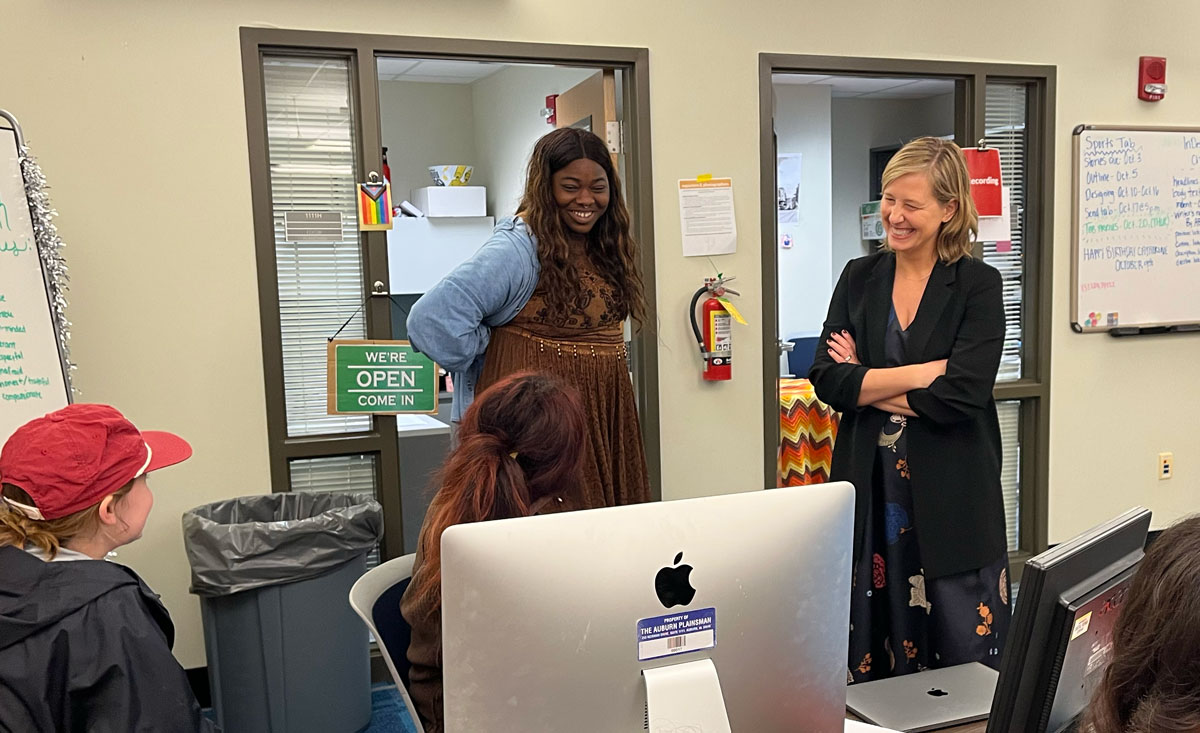A Spirit that is Not Afraid:
Plainsman editor-in-chief Destini Ambus elevates Auburn voices
mbus began as a campus writer for the Plainsman in January 2020. She was drawn to the paper after working for her high school’s yearbook in Beulah, Alabama, and sought more storytelling opportunities during her college career.
“I love talking to people. I love getting to know them and feature stories allow me to get to know them very well – their hopes, dreams, fears – it’s so human. I want to be able to tell those stories in a mindful way,” Ambus said. “When COVID hit, it was the only thing that kept me connected with other people. Everyone, if they have the chance to write for the Plainsman, should. Journalism is such a powerful tool in understanding where people come from.”
The Auburn Plainsman is an award-winning, editorially independent newspaper run entirely by students. Any Auburn student can apply and write for the Plainsman. Alumni of the newsroom include national reporters, novelists and Pulitzer Prize and Hearst Award-winning journalists.
At Auburn, Ambus has covered Chris Roberts’ first day as the university’s 21st president, reported on Yusef Salaam of the Exonerated Five’s visit to campus and featured Harold Melton, Auburn’s first Black Student Government Association president and former chief justice of the Georgia Supreme Court.
In addition to chronicling historic events and featuring members of the Auburn Family across campus, Ambus said the Plainsman amplifies the student voice through the ranks of the university.
“Without a student newspaper as the medium in between the students and the faculty, the faculty is just going to keep doing what they think is right without taking into consideration students’ opinions,” Ambus said. “Sometimes what they think is right is not actually what’s best for students, so it’s important to hold them accountable. The Plainsman lets leadership know what students are actually thinking.”
Ambus has been heavily involved with the Plainsman since her second semester at Auburn. She served the paper as a campus writer, campus reporter, opinion editor and content editor before applying for the editor-in-chief position.
With that extensive experience, Ambus was uniquely positioned to identify and fill gaps in the Plainsman’s operations.
“This is the only thing I’ve ever really loved. I’ve devoted two and a half years of my life to this. Being a managing editor, you see all of the gaps in the newsroom clearly,” Ambus said. “What I want to get out of my professional development over the next year is more awareness of the way that I talk to people, phrase things and help people that come after me. It’s really important to me to develop the newsroom to be able to do good work after I leave.”
These stories, according to Ambus, are founded in the need to engage with the community that the Plainsman represents.
“One of my priorities for the paper, when I applied for the position, was more equitable content. The percentage of people in Auburn that are people of color or non-white should equal the percentage of coverage that we have in the Plainsman,” Ambus said. “My second point was that we need to have more outreach. We need to be on the concourse more, making sure that people know they’re there because good journalism doesn’t work unless there’s an established relationship between the community and the journalists. The community needs to trust us enough to write the stories for them and write them well.”
Ambus pursued a summer internship at the Montgomery Advertiser to push herself. She covered the public safety beat, which includes crime and breaking news. It’s a new style for Ambus, but one that is preparing her to work in a newsroom after college.

Until her term as editor-in-chief ends in spring 2023, Ambus will carry what she learned from the Advertiser’s newsroom and The New York Times back to the Plainsman and beyond.
“For the Advertiser, I like being at the beginning stages of just being a writer and learning everything,” Ambus said. “What I’m hoping to take away from that experience is a base understanding of how a newsroom that’s not a collegiate newspaper works. After college, it’s my goal to get more field experience and come back to teach what I learned.”